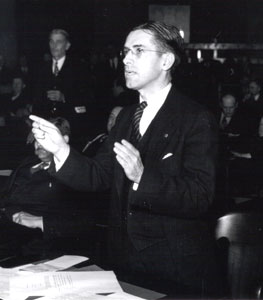
William Prentice Cooper Jr.
Governor Prentice Cooper was born in Shelbyville to William Prentice and Argentine S. Cooper. He was educated in Bedford County schools, including Hannah’s School at Shelbyville, Butler’s Creek Elementary School, and the Webb School at Bell Buckle. He attended Vanderbilt University from 1913 to 1915 before transferring to Princeton University, where he received a bachelor’s degree in 1917. He later received honorary degrees from Lincoln Memorial University, Harrogate, in 1940; Muhlenberg College in Allentown, Pennsylvania, in 1942; and Hartwick College, Oneonta, New York, in 1943.
After graduation from Princeton, he volunteered for service in World War I and was inducted into the U.S. Army as a private. He received officer training and rose from master gunman to sergeant to second lieutenant. He served with Battery E of the 307th Field Artillery until May 1918, when he was transferred to Fort Monroe, Virginia. The Armistice was signed before he could be shipped to France, and he was honorably discharged on January 23, 1919.
Cooper studied law at Harvard University and received an LL.B. degree in 1921. He was admitted to the bar the following year and returned to Shelbyville to open a law practice next door to his father, a prominent lawyer and banker. He practiced law in Shelbyville and Lewisburg between periods of public service.
In 1923 Cooper began his extensive Democratic political career in the Tennessee House of Representatives, representing Bedford County. He was later elected district attorney general of the Eighth Judicial Circuit and then city attorney of Shelbyville. From 1937 to 1939 he served in the state Senate, representing Bedford, Coffee, and Moore Counties.
Cooper served as governor for three consecutive terms, from 1939 to 1945. During his administration World War II was fought and won, and Tennesseans played many important roles in the conflict both at home and abroad. Cooper took an active role in mobilizing the state for war. In anticipation of national events, he appointed a Tennessee State Defense Council in 1940, the first such council in America. He also initiated a million-dollar national defense bond to purchase Sewart Air Base in Smyrna. When the war began, Tennesseans participated in every phase of the military effort. Over 300,000 Tennesseans served in the armed forces, while the state’s activities on the home front were critical to the victory. Defense plants were built across the state, including the powder plant in Millington, an aircraft plant in Nashville, and a shell-loading plant at Milan. Industries producing clothing, arms, and food employed thousands of Tennesseans; war contracts brought millions of dollars to the state’s economy.
In addition to his contributions to the war effort, Cooper amassed an important domestic record. Under his administration the legislature passed the first civil service act for state employees, and he achieved the largest debt reduction in the state’s history. He increased funding for education by 66 percent, doubled old age assistance, saw that free textbooks were provided to children in the lower grades, established a statewide tuberculosis hospital system, and added lands to state parks and forests.
After his final term as governor, he was appointed ambassador to Peru. His mother, who had served as first lady to the bachelor governor, accompanied him to Peru to act as official hostess. Cooper served as ambassador from 1946 to 1948. When he returned to Tennessee, he was selected as a delegate to the 1953 State Constitutional Convention.
On April 25, 1950, the former governor married Hortense Powell, the daughter of Ferdinand and Margaret McGavock Hayes Powell. They had three sons: William Prentice III, James H. S., and John N. Powell. He and Mrs. Cooper actively participated in state historical organizations, Lutheran Church activities, and civic affairs. Cooper died on May 18, 1969, at the Mayo Clinic in Rochester, Minnesota, a victim of cancer. He was buried in Jenkins Chapel Cemetery in Bedford County.



